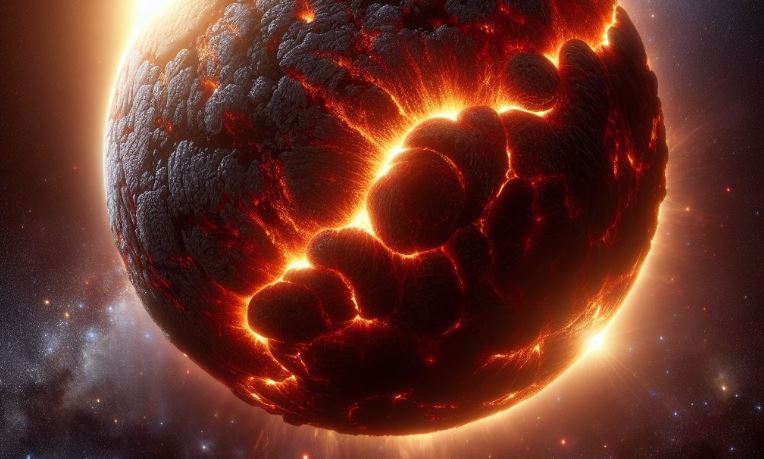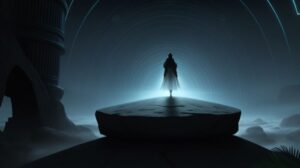Have you ever looked up at the bright sun and wondered what would happen if the sun stopped shining? It’s a scary thought, but one that scientists have pondered for years. It’s a scene straight out of science fiction, but what would actually happen if our star abruptly switched off? The answer, while bleak, unveils a fascinating domino effect on our planet.
Our first clue wouldn’t be darkness. Light travels at an astonishing 186,282 miles per second, which is mind-bogglingly fast. But here’s the thing: Earth is eight light-minutes away from the sun. That means it would take eight whole minutes for the sun’s light to make the journey to us. So, for those eight minutes, we’d still be bathed in the familiar warmth of sunlight. It would be an eerie twilight, a strange pause before the real change hit. Imagine stepping outside on a beautiful summer afternoon, only to have the sun abruptly vanish. The sky wouldn’t plunge into immediate darkness; there would be a gradual dimming, a sense that something wasn’t quite right. Then, eight minutes later, the world would be plunged into a cold, inky blackness unlike anything we’ve ever experienced.
What would the Collapse of the Food Chain look like?
One of the sun’s most critical roles is powering life on Earth through photosynthesis. Plants act like solar panels, capturing sunlight and using its energy to convert carbon dioxide and water into yummy sugars – the fuel that runs the entire food chain. It’s like a giant cosmic kitchen, where plants take sunlight as the main ingredient and cook up delicious meals for everything from tiny insects to enormous whales. Without that sunshine, photosynthesis would grind to a halt. Plants would be the first domino to fall, their leaves turning from vibrant green to a dull, lifeless brown. Herbivores, like deer and rabbits, would find their buffets of plants dwindling, leading to hunger and desperation. Carnivores would be next in line. Imagine a lion, a magnificent predator used to taking down powerful prey, facing a world devoid of grazing animals. The entire food chain would be thrown into chaos, a real-life Hunger Games scenario playing out not just in the savannas of Africa but everywhere on Earth.
How will it affect the Weather?
The lack of sunlight wouldn’t just affect our dinner plates; it would plunge Earth into a deep freeze. Our planet acts like a giant blanket, trapping some of the sun’s heat. Initially, this thermal insulation would keep things from getting too cold too quickly. Think of it like taking a hot pot out of the oven – it stays warm for a while, but eventually cools down.
Here’s the scary part: the average global temperature would plummet by about 1 degree Celsius (1.8 degrees Fahrenheit) every day. Within a few weeks, we’d be shivering in temperatures colder than anywhere on Earth today. Oceans would start to freeze over at the surface, and even the hardiest organisms, like the extremophiles that thrive in the deepest ocean trenches, would struggle to survive if the sun stopped shining.
Will it be the End of Modern Civilization?
Our dependence on sunshine goes far beyond growing food and staying warm. Solar panels, a rapidly growing source of clean energy, would become useless. Fossil fuels would still work, but the complex infrastructure that keeps our cities lit and powered would crumble without the communication networks that rely on satellites. Imagine a world without electricity, internet, or even basic transportation – a complete societal breakdown.
What would happen to Our Solar System if the Sun Stopped Shining?
But what about the rest of the solar system? Here’s a quick rundown:
- Planetary Drift: With the sun’s gravitational pull no longer in play, the planets would drift off into space. The delicate dance that keeps our solar system in harmony would be disrupted, potentially leading to collisions or ejections.
- Darkness Reigns: Without the sun’s light to illuminate the cosmos, our solar system would be plunged into perpetual darkness. The once vibrant tapestry of stars would fade into obscurity.
- Survival Beyond Earth: Any hope for survival would lie in our ability to colonize other planets or find alternative sources of energy. Humanity’s future would hinge on our ability to adapt and innovate in the face of unimaginable adversity.
Wouldn’t We Have Warning?
Thankfully, a scenario where the sun stopped shining is extremely unlikely. Our sun is a giant ball of burning gas, and its internal furnace is fueled by a process called nuclear fusion. This process is incredibly stable, and scientists can predict the sun’s behavior for millions of years to come.
However, the sun does have its dramatic moments. Solar flares and coronal mass ejections (CMEs) are powerful bursts of energy that can disrupt our power grids and communications. These are like tiny temper tantrums compared to a complete shutdown, but they serve as a reminder of the sun’s immense power.
The good news? Our understanding of the sun is constantly evolving. With continued research and innovation, we can ensure a brighter future – literally – for generations to come.






